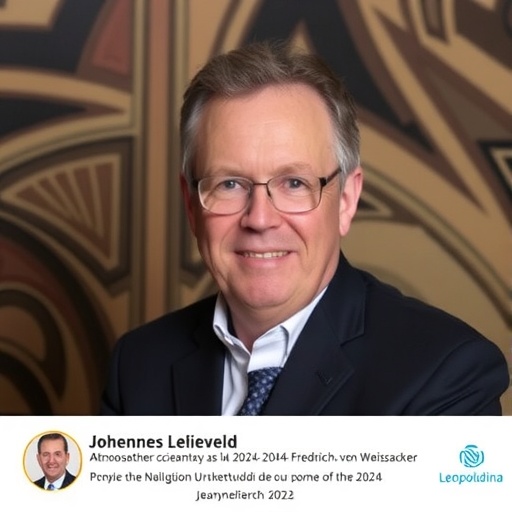Johannes Lelieveld, a renowned atmospheric chemist, has been recognized with the prestigious 2024 Carl-Friedrich-von-Weizsäcker-Prize, underscoring his groundbreaking contributions to understanding the Earth’s atmosphere through innovative measurement techniques and advanced computer modeling. His work intricately explores the delicate interplay between chemical reactions and meteorological phenomena, revealing critical insights into how these processes impact the atmosphere’s self-cleaning mechanisms, climate dynamics, and public health.
Lelieveld’s scientific journey has been pivotal in decoding the complex chemistry within the Earth’s atmosphere. By integrating novel aircraft-based measurements with sophisticated simulation models, he has illuminated the ways in which chemical species transform and migrate through atmospheric layers. These investigations have been instrumental in quantifying the atmosphere’s ability to eliminate pollutants naturally, an essential function that maintains air quality and regulates greenhouse gases.
One of Lelieveld’s most notable research avenues involves the analysis of atmospheric pollutants such as particulate matter and ozone—both central to the global climate system and human health crises. His work dismantles the traditional separation of climate change and air pollution, demonstrating how these issues interweave to exacerbate environmental challenges and public health burdens. By establishing this connection, Lelieveld’s research catalyzes a more integrated approach to environmental policy and health protection strategies.
Further advancing the field, Lelieveld has explored how Asian monsoonal systems influence atmospheric chemistry and circulation patterns. His data-driven models depict how monsoon rains and winds enhance the atmosphere’s capacity to renew itself by facilitating chemical reactions that break down harmful compounds. This has key implications for understanding regional air quality and climate impacts in some of the world’s most populous and industrially active regions.
In addition to natural phenomena, Lelieveld has made significant contributions to assessing anthropogenic impacts such as nuclear disasters. His studies on the atmospheric dispersion of radioactive materials following the Fukushima and Chernobyl incidents provide invaluable data on the movement and long-term effects of hazardous pollutants. These findings aid in disaster response planning and highlight the resilience and vulnerabilities of the atmospheric system to extreme contamination events.
Recently, Lelieveld’s research has sharpened its focus on quantifying the health impacts of air pollution. By linking emission sources with epidemiological outcomes, he has identified how exposure to polluted air significantly elevates mortality rates worldwide. His comprehensive models evaluate how reducing specific pollutants can lead to substantial health benefits, guiding policymakers to prioritize interventions that save lives while also mitigating climate change.
Lelieveld’s work extends beyond research, encompassing active engagement in policy advice. His involvement in the Leopoldina’s “Clean Air” Ad hoc statement exemplifies his commitment to translating scientific insights into actionable guidance for governments and society. This interface between cutting-edge science and practical policymaking embodies the mission of the Carl-Friedrich-von-Weizsäcker-Prize: connecting scientific excellence to societal benefit.
Educated at the University of Utrecht with a doctorate in atmospheric physics, Lelieveld’s academic and professional trajectory spans continents and disciplines. Academically, he has held professorships in atmospheric physics and chemistry at leading Dutch universities before taking on his directorial role at the Max Planck Institute for Chemistry in Mainz. His leadership has promoted interdisciplinary research combining physics, chemistry, meteorology, and health sciences.
Lelieveld’s global standing is reflected in his memberships in prestigious scientific organizations such as the Royal Society of Chemistry and the American Geophysical Union. His accolades include the Vilhelm Bjerknes Medal from the European Geosciences Union and the high-impact Cardiovascular Research Award from the European Society of Cardiology, testament to the broad impact of his work across atmospheric science and medical research.
The Carl-Friedrich-von-Weizsäcker-Prize, established by the Stifterverband in conjunction with the German National Academy of Sciences Leopoldina, acknowledges outstanding researchers addressing societal challenges through science. Awarded biennially, the prize celebrates scholars whose work leads to innovative, science-based policy recommendations. Lelieveld joins a distinguished roster of recipients who have shaped public discourse and policymaking in fields ranging from marine biology to economics and neuropsychology.
Looking ahead, Lelieveld will deliver the prize lecture titled “Air Quality, Climate Change and Health” at the Leopoldina’s 2025 Christmas Lecture in Halle (Saale). This event will further disseminate his findings to the scientific community and the public, emphasizing the urgency of integrated atmospheric research in tackling climate and health crises.
The significance of Lelieveld’s research cannot be overstated in a world grappling with escalating environmental degradation and health threats. His integrative scientific approach furnishes a robust foundation for developing strategies that simultaneously alleviate atmospheric pollution, mitigate climate change, and improve public health outcomes, thereby steering global efforts toward a sustainable future.
The award and Lelieveld’s ongoing research underscore the critical role of atmospheric science in informing evidence-based policy decisions. By merging empirical observations with computational modeling, his work exemplifies the frontier of environmental research, where interdisciplinary collaboration generates knowledge that transcends academic boundaries to serve humanity at large.
Johannes Lelieveld’s career reflects an inspiring synthesis of scientific rigor, innovation, and societal commitment. His receipt of the 2024 Carl-Friedrich-von-Weizsäcker-Prize rightfully honors a scientist whose work not only expands our understanding of the atmosphere but also empowers society to confront and resolve some of the most pressing challenges of our time.
Subject of Research: Earth’s atmospheric chemistry and meteorological processes; air pollution impact on climate and human health; atmospheric self-cleaning capacity.
Article Title: Johannes Lelieveld Awarded 2024 Carl-Friedrich-von-Weizsäcker-Prize for Groundbreaking Atmospheric Research.
News Publication Date: Not explicitly provided (context indicates 2024).
Web References:
- Leopoldina: https://www.leopoldina.org
- Stifterverband: https://www.stifterverband.org
Keywords: Earth atmosphere, Atmospheric chemistry, Climatology, Meteorology, Pollution, Air quality, Smog, Greenhouse effect, Human health




